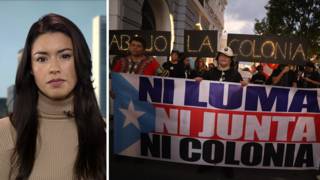
Nearly two weeks after Hurricane Maria slammed into Puerto Rico, the capital San Juan is still facing a dire lack of food, clean water and electricity. Hanging over one of San Juan’s freeway overpasses near the neighborhood of Playita are multiple cloth signs reading, in Spanish, ”SOS Playita needs food and water.” We air voices from Puerto Rico’s neighborhood of Río Piedras in the capital, San Juan, speaking about the self-organized relief efforts in the wake of Hurricane Maria. Special thanks to Democracy Now!’s Juan Carlos Dávila.
Transcript
AMY GOODMAN: I want to turn now to the voices from Puerto Rico’s neighborhood of Río Piedras in the capital, San Juan, speaking about the self-organized relief efforts in the wake of Hurricane Maria.
JUAN CARLOS DÁVILA: After Hurricane Maria made landfall, the community of Río Piedras in the capital city of San Juan has taken matters into their own hands, not expecting help from the government anytime soon. Río Piedras is home to the University of Puerto Rico, which was on strike last spring. This is José Bellaflores Díaz, a striking student who has been leading community efforts in Río Piedras since Hurricane Maria hit.
JOSÉ BELLAFLORES DÍAZ: A friend of mine and I were sitting in our apartment, and we understood that this was a major catastrophe and we had to do something to help our neighbors, to help our community and to help our country. So, one day, we just headed out and started to remove plants and everything that fell in the streets. Once we started working, the people that passed by, the community, started to join us, to work with us. And basically, we started organizing ourselves. We started reuniting ourselves in this church, the Bautista church here nearby. And we just started to create a plan. Here is where we organize ourselves. This is where we reunite ourselves. And these are basically our strategies that we use to attend the different necessities.
FERDINAND GONZÁLEZ: [translated] My name is Ferdinand González. I’m an artist. We’ve already had situations where we’ve waited for the central government to come and help us. And we’ve waited in vain. We’ve waited and waited. So, this time, we did not wait. What we did was unite the whole community. We know what we need. We know what each of us requires. So we established five committees. There’s a committee for security, another one for food and one for improvements to lift up Río Piedras together. We’re seeing that the effort needs to be done from the inside out. We cannot wait for someone to come from outside, because of the urgency. They’ve left us a week without anything. There’s no supplies, nothing. We need to take care of ourselves. And that’s what you see here.
JUAN CARLOS DÁVILA: One of the efforts made to help the community of Río Piedras is providing food to those in need. In a Baptist church, Primera Iglesia Bautista de Río Piedras, different organizations cook food daily and distribute it in the nearby plaza.
MARIAN MORALES: [translated] My name is Marian Morales. There are people here with different beliefs and cultures, but we’re all united for the common good of helping each other, of offering that helping hand to those in need. Today we cooked lentil soup, rice and beans, and brown rice. We also offered melon, pineapples and nectarines.
FABIO CORTÉS: [translated] My name is Fabio Cortés. We’ve united with university students, and the churches have also helped us by bringing food. We clean and pick up the garbage. We are trying to lift up Río Piedras however it is possible, because the government hasn’t come here. Río Piedras exists. We should not be abandoned, but helped. We’re not asking for anything for ourselves individually, only for the community. The help should come as it becomes available. We should receive support, not only material support, but also emotional support.
JUAN CARLOS DÁVILA: As Río Piedras residents are hoping that government assistance eventually arrives, José Bellaflores Díaz voiced concern about the way relief efforts are put into effect by governmental agencies and NGOs run by outsiders.
JOSÉ BELLAFLORES DÍAZ: The ideal is that they come here and they, you know, try and listen to what’s happening. I think that’s the most important part here, is just to listen—not establish their ways, not establish their protocols. It’s not just to work hand by hand what was already started here in the community. We are very organized. We don’t need no one to come here and tell us what we need to do, because we know what we need to do. We know our community. We know our necessities. We know how to attend them. Obviously, we don’t have the resources.
AMY GOODMAN: That report by Democracy Now!’s Juan Carlos Dávila in San Juan.













Media Options